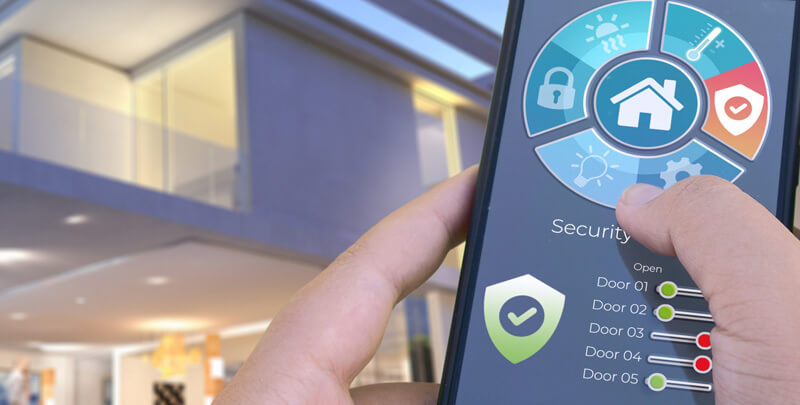5 Smart Home Devices That Could Save You Money

Smart homes are no longer futuristic; they're becoming a reality for many homeowners.
With the advancement of technology, the popularity of smart home devices has surged in recent years.
Understanding Smart Homes
These devices offer convenience, security, and, most importantly, substantial cost savings. In this blog, we’ll explore five top smart home gadgets and devices that can help you save money.
From reducing energy bills to enhancing home security, these devices are changing how we live and manage our homes. So, let’s delve into the world of the best smart home devices and technology and discover how it can benefit your wallet.
The Latest Trends and Innovations in Home Technology
Smart home devices are revolutionising how we interact with our homes, offering a new level of convenience and efficiency. But beyond comfort, these devices can also be your allies in saving money.
Our goal in this blog is to shed light on five specific smart home devices that not only make your life more comfortable but also have the potential to cut down your household expenses.
From smart light switches to smart plugs, to thermostats to energy monitoring devices and everything in between, we’ll walk you through the incredible money-saving capabilities of these devices. So, let’s begin this journey towards a more innovative and economical home.
1. Smart Thermostats
Smart thermostats are a game-changer in home climate control. These devices work by learning your home’s heating and cooling preferences and automatically adjusting the temperature to optimise energy usage.
They can be controlled remotely through your smartphone app, and many are compatible with voice assistants like Alexa and Google Assistant.
2. LED Smart Lighting
LED (Light Emitting Diode) smart lighting combines the energy efficiency of LED bulbs with the convenience of innovative technology. These smart light bulbs use significantly less electricity than traditional incandescent bulbs and have a much longer lifespan.
What sets them apart is the ability to control them remotely and customise their brightness and colour. You can set the mood for any occasion with a simple tap on your smartphone.
The benefits of LED smart lighting go beyond just energy savings. They can last more than 20 years, reducing the frequency upfront cost of bulb replacements and saving you money in the long run.
3. Smart Home Security Systems
Investing in a smart home security system not only enhances the safety of your home but can also lead to substantial savings on your homeowners’ insurance premiums.
These systems typically include features such as remote monitoring and automation. With remote monitoring, you can monitor your property from anywhere, providing peace of mind and deterring potential intruders.
Automation features like smart locks, motion sensors, and security cameras allow you to control and monitor your home’s security easily. You can protect your home and wallet by installing an entire smart home camera system.
4. Energy Monitoring Devices
Energy monitoring devices provide insight into your home’s electricity consumption. They can track and optimise your energy usage by identifying patterns and pinpointing areas where you can cut back.
Some smart energy monitor devices offer real-time alerts when energy consumption spikes unexpectedly, helping you promptly identify and address energy-wasting habits and appliances.
Examples of energy monitoring devices include the Sense Energy Monitor, Neurio Home Energy Monitor, and the Emporia Vue Energy Monitor.
By using these and other devices well, you can take control of your energy consumption and make informed decisions to reduce your utility bills significantly.
5. Smart Water Management
Water bills can be a substantial expense for many households. Smart water management devices can help you save money by tracking your water usage and detecting leaks.
Smart water meters, for instance, provide real-time data on your home’s water supply and consumption, allowing you to identify any unusual spikes that could indicate a leak.
Leak detectors are another type of smart water management device. They can notify you when they detect a leak, preventing potentially costly water damage.
Smart Home Devices are The Most Useful
Smart and connected home devices have revolutionised our lives, offering unparalleled convenience and efficiency to people from all walks of life.
Whether you’re a busy professional, a tech enthusiast, a parent, or an elderly individual, these devices can enhance your daily routines and simplify tasks.
Smart thermostats allow you to control your home’s temperature remotely, optimising energy consumption and reducing bills. Smart security systems provide peace of mind by allowing you to monitor your home from anywhere, enhancing safety for families and individuals.
Voice-activated assistants like Alexa and Google Home offer hands-free assistance, making tasks as simple as setting reminders, answering questions, and controlling other connected devices.
These devices can enable independent living for older adults by providing assistance and monitoring capabilities. In essence, the usefulness of smart home devices transcends demographics, offering improved comfort, security, and control over one’s living space for everyone.

Smart Homes vs Ordinary Homes
Smart homes and ordinary homes represent two distinct paradigms of living, each offering unique advantages and considerations. Smart homes are characterised by integrating advanced technology and automation systems, allowing residents to remotely control various aspects of their homes, such as lighting, security, heating, and entertainment.
In contrast, ordinary homes typically rely on traditional manual systems and lack the interconnectedness and convenience of smart homes.
While smart homes offer the comfort of remote control and energy efficiency, they can be expensive to set up and may raise concerns about privacy and cybersecurity.
On the other hand, ordinary homes offer a more straightforward, cost-effective way of living but may need more modern conveniences and energy-saving features that smart homes provide.
The choice between the two ultimately depends on individual preferences, budget, and the willingness to embrace technology daily.
Best and Transformative Experience
People who have integrated smart home devices into their living spaces report various transformative and convenient experiences. One of the most frequently cited benefits is the enhanced control and automation of household functions.
Smart thermostats allow homeowners to effortlessly and automatically adjust their home’s temperature remotely, saving on energy costs while ensuring optimal comfort.
With voice or app control, smart lighting systems offer customisable ambience and energy savings. Home security is greatly augmented with smart cameras and sensors, providing real-time monitoring and alerts, contributing to a heightened sense of safety.
Voice-activated virtual assistants like Alexa or Google Assistant streamline daily tasks, from setting reminders to providing weather updates.
Moreover, the convenience of managing various devices from a single app or through voice commands simplifies daily routines. Overall, the best experiences with smart home devices often revolve around greater control, energy efficiency, convenience, and peace of mind, making life at home more enjoyable and efficient.
Advantages of Installing Smart Home Devices
Smart home devices can offer several advantages that enhance convenience, security, energy efficiency, and overall quality of life. Here are some of the critical benefits of installing smart home devices:
Convenience:
- Remote control of best smart home devices and everything: You can control and monitor your ultimate smart home devices from anywhere using a smartphone or tablet.
- Voice assistant control: Many smart devices work with voice assistants like Amazon Alexa, Google Assistant, and Apple Siri, allowing you to control them using voice commands.
- Automation: Set up schedules, routines, or automation rules to perform tasks automatically, such as adjusting lighting, temperature, or locking doors.
Energy Efficiency:
- Smart thermostats: Optimize heating and cooling based on your schedule and preferences, not wasting energy and potentially reducing energy consumption and utility bills.
- Energy use monitoring: Track energy usage and identify areas where you can save on electricity and reduce your environmental footprint.
- Lighting control: Adjust lighting to save energy levels and turn lights off when unnecessary, saving energy and money.
Security:
- Surveillance: Smart cameras provide real-time video monitoring and motion detection alerts, enhancing home security.
- Smart locks: Control and monitor your door locks remotely, grant temporary access and receive notifications when someone enters or exits the front door of your home.
- Intrusion detection: Smart sensors and alarms can alert you to potential security breaches, such as window or door openings.
Safety:
- Smoke and carbon monoxide detectors: Receive immediate alerts on your phone if these detectors are triggered, even when you’re away from home.
- Water leak detection: Smart sensors can identify water leaks and help prevent costly water damage.
Comfort:
- Smart blinds, outdoor lights and curtains: Adjust window coverings’ bright lights remotely to control natural light and privacy.
- Smart fans and heaters: Control the temperature and airflow of ceiling fans and space heaters in different rooms for personalised comfort.
Health and Well-being:
- Air quality monitors: Track indoor air quality and receive recommendations for improving it.
- Sleep trackers: Some smart devices can monitor your sleep patterns and provide insights for better sleep quality.
Increased Home Value:
Smart home features can increase the resale value of your home as they are increasingly sought after by homebuyers.
Accessibility:
Smart home devices can be especially beneficial for disabled individuals, making controlling and interacting with their living spaces easier.
Cost Savings:
While there is an initial investment in smart appliances and smart home technology, the potential energy savings, lower utility costs, improved security, and reduced maintenance costs can lead to long-term financial benefits.
Customisation:
Smart home ecosystems are highly customisable, allowing you to tailor your automation to your needs and preferences.
It’s essential to consider the compatibility of other smart home devices and devices and the security of your network when setting up a smart home system to maximise these advantages while ensuring your privacy and data are protected.

Maximise Smart Home Devices
To see how much power get the most out of your various smart speaker companion apps and home devices, here are some general tips:
- Regularly update the firmware and apps of your smart devices to ensure they operate efficiently and securely.
- Set up automation routines to optimise energy usage and enhance security.
- Explore smart device compatibility and consider a centralised control hub for a seamless experience.
- Utilise voice commands or apps for convenient control of your devices.
Additionally, it’s worth checking whether government incentives or rebates are available for using energy-efficient technologies. These incentives can further reduce the initial cost of adopting smart home devices and improve your return on investment.
Cost and Future Investment
The cost of installing smart home devices can vary significantly depending on several factors. The primary determinants of the expense include the number and type of appliances you wish to incorporate, the complexity of the existing setup, the installation process, and the brand or quality of the products chosen.
Basic smart home setups with a few bulbs or a smart thermostat can be relatively affordable. In contrast, more comprehensive systems involving security cameras, smart locks, and home automation hubs can incur a substantial cost.
Additionally, professional installation services may add to the overall price, though many homeowners opt for self-installation to save money. It’s essential to consider the long-term savings in energy efficiency and convenience that smart home devices can provide, making the initial investment a worthwhile consideration for many.
Live the Smart Way!
These five best smart home devices are not just gadgets; they’re investments that can lead to substantial savings over time. Smart thermostats, LED smart lighting, smart home controls, security systems, energy monitoring devices, smart displays, and innovative water management tools can all contribute to a more efficient and cost-effective home.
The importance of adopting smart home technologies is growing, and so are the opportunities for saving money.
By making informed choices about smart upgrades and implementing these devices strategically, you can enjoy a more comfortable, secure, and cost-effective lifestyle. So, embrace the future of smart homes and watch your savings grow.
Please note: This information is provided for advice purposes only. Regulations differ from state to state, so please consult your local authorities or an industry professional before proceeding with any work. See After Hours Electrical’s Terms & Conditions here.
